01 Dec2017
By Deborah Koolbeck
On the same day that Chairwoman Virginia Foxx (R-NC) released her Higher Education Act (HEA) reauthorization bill in the U.S. House of Representatives, the Trump Administration released a set of principles for HEA reauthorization.
The White House document (see PDF here) reveals five broad goals and eight policy principles for consideration as the reauthorization process begins in the U.S. House of Representatives. The House Education and the Workforce committee is expected to move the bill forward starting the week of December 4. On the U.S. Senate side, Chairman Lamar Alexander (R-TN) has stated that HEA reauthorization will be a priority for the Health, Education, Labor, and Pensions committee next year.
01 Dec2017
By Deborah Koolbeck
On December 1, the Republicans of the U.S. House of Representatives Committee on Education and the Workforce released their bill to reauthorize the Higher Education Act. H.R. 4508, the “Promoting Real Opportunity, Success, and Prosperity though Education Reform (PROSPER) Act,” would change or repeal aspects of the current law.
While we are still analyzing the bill, here are few key provisions that would affect educator preparation:
09 Nov2017
By Deborah Koolbeck
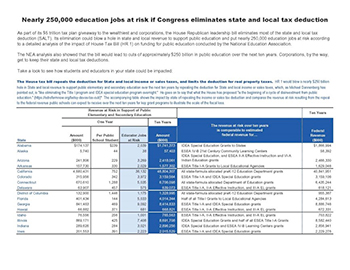
Today the National Education Association (NEA) released an analysis of the U.S. House tax reform bill, H.R. 1, the “Tax Cuts and Jobs Act,” to project the impact on PK-12 education of the elimination of the State and Local Tax (SALT) deduction for individuals (the tax plan permits corporations to keep this deduction).
In a press release, the NEA highlighted the potential effect of this single elimination: “The impact of eliminating SALT on public education is nearly equal to the education jobs lost during the Great Recession. By most accounts, the country lost about 300,000 education jobs during that time.”
09 Nov2017
By Zachary VanHouten
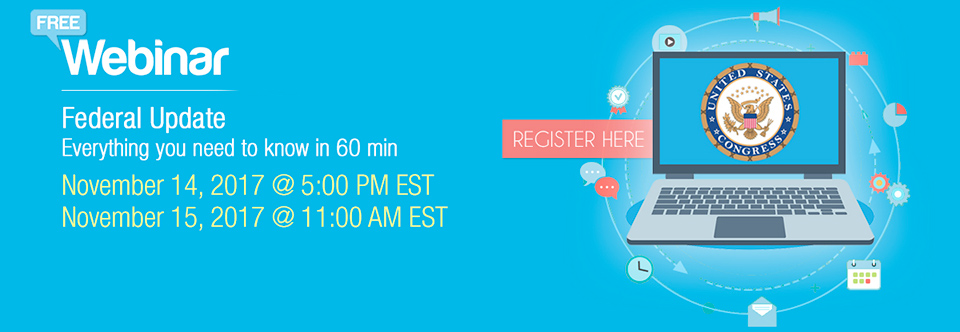
As the tax reform debate wages on in Congress, and as many other items linger on the agenda, there is much to accomplish in Washington by the year’s end. Many of the items will have an impact on the education community. Let AACTE help unpack and process some of the latest developments for you by joining our free, members-only November and December Federal Update webinars.
To accommodate busy end-of-year schedules and various time zones, AACTE offers each webinar at two different dates and times. Click on your preferred date/time below to register.
08 Nov2017
By Deborah Koolbeck
Last week Chairman Kevin Brady (R-TX) of the U.S. House of Representatives Committee on Ways and Means introduced a tax reform bill, H.R. 1, The Tax Cuts and Jobs Act, and scheduled the markup to start November 6 and continue until the work is completed. This process was initiated via reconciliation through the Fiscal Year 2018 budget resolution.
Prior to the markup beginning, Brady offered a manager’s amendment making changes to the original bill, and the markup (watch it live and view additional resources here) allows committee members to offer amendments.
26 Oct2017
By Zachary VanHouten

If you missed this week’s member-exclusive AACTE Federal Update webinar, the recording is now available to view in AACTE’s Advocacy Center (scroll down to the “Federal Update Webinars” box).
With so much on the congressional agenda, it is tricky, but crucial, for advocates to stay informed. The AACTE Federal Update webinar brings you up to speed on the latest developments. It’s also a great learning opportunity for other faculty at you institution – as well as your students! – so we encourage you to share the recording with them.
16 Oct2017
By Zachary VanHouten
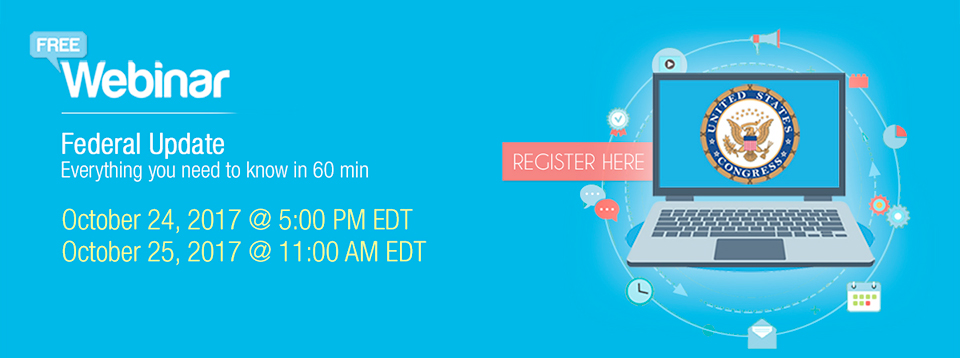
Education funding is at risk of devastating cuts if Congress cannot reach a budget deal that raises the caps on federal spending for Fiscal Year 2018. Deferred Action for Childhood Arrivals (DACA) reform, tax reform, the Children’s Health Insurance Program, and reauthorization of the Higher Education Act (HEA) are all items vying for attention on an overcrowded congressional agenda.
With so many issues facing Congress, the need for the profession to stay informed is more important than ever. To keep up to date with all the latest information, please join AACTE for one of the October Federal Update webinars.
16 Oct2017
By Jane E. West
The American Council on Education, the major coordinating association for our nation’s colleges and universities, is leading the Protect Dreamers Higher Education Coalition, of which AACTE is a member. The coalition is coordinating a week of advocacy efforts beginning today, October 16, and has developed a website providing multiple resources related to Dreamers, including fact sheets and talking points, which can be used by individual campuses for advocacy.
In addition, the coalition is leading a letter that your institution can sign on to – but time is tight. The deadline is Wednesday, October 18, at noon EDT. To have your institution sign on to the letter, please reach out to your president’s office as well as your government relations staff. Find the instructions here.
29 Sep2017
By Deborah Koolbeck

As Congress returned from August recess, its agenda included a laundry list of items, and it is shaping up to be a very busy fall on Capitol Hill. Budget and appropriations, hurricane relief, the Deferred Action for Childhood Arrivals program, Higher Education Act reauthorization, and tax reform are just some of the issues that will fill the congressional calendar. For many of these topics, the voice of the education profession will be an important perspective for your members of Congress to hear.
Follow these three steps to ensure your constituent voice is heard:
26 Sep2017
By Zachary VanHouten
As part of continued efforts to provide relief for hurricane-affected regions, the U.S. Department of Education this week issued guidance to outline flexibility in reporting deadlines, grant-funded activities, continuity planning for disrupted programs, and fiscal management efforts. This guidance applies to state and local education agencies, Bureau of Indian Education-funded schools, postsecondary institutions, and other Department grantees.
Institutions affected by the recent hurricanes are highly encouraged to review the guidance, particularly if your program receives funding from a federal grant, receives federal student financial aid, or if you have other general questions regarding postsecondary education relief.
15 Sep2017
By Zachary VanHouten
By October 2, the Institute for Education Sciences (IES) is seeking input from the field on its requirements related to efficacy, replication, and effectiveness studies.
The impetus of the feedback request follows recommendations provided from a technical working group that was assembled in October 2016. IES seeks to understand whether the current Goals 3 and 4 (out of its full list of five) are meeting the needs of the field or whether modifications would be beneficial to replication and effectiveness studies. Goal 3 addresses efficacy and replication studies, and Goal 4 supports independent evaluation of prior efficacy studies.
08 Sep2017
House and Senate Move on Education Funding Bills
By Deborah Koolbeck

Congress returned from August recess and hit the ground running on its work funding the federal government as the September 30 deadline looms.
U.S. House of Representatives Action
You might recall that the House passed four appropriations bills as a single package at the end of July. The House determined it would move the eight remaining appropriations bills to the floor as a single package – including the Labor, Health and Human Services, Education, and Related Agencies (Labor-H) bill – immediately after August recess. A call for amendments went out in early August.
05 Sep2017
By Zachary VanHouten
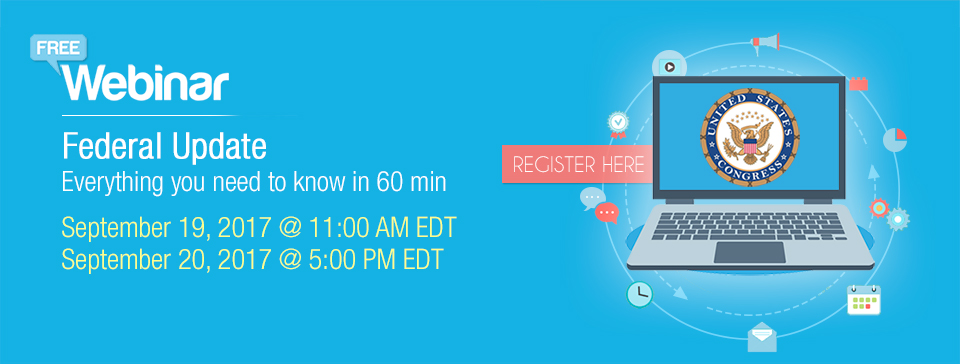
As classes resume at your institution, so too does the work of Congress, which returns to Washington today following its August recess. The disaster relief for Hurricane Harvey may upend the Congressional agenda, potentially shuffling a laundry list of items Congress needs to address, including funding for FY18 and where the federal dollars will flow.
With all of this going on, it has never been more important to remain informed and engaged – and AACTE’s members-only Federal Update webinars help you do just that. You can sign up now for this month’s webinars, September 19 or 20 (see below); you can also view archived webinars and presentation slides through this link.
05 Sep2017
By Zachary VanHouten
In order to support the communities affected by Hurricane Harvey and its aftermath, the U.S. Department of Education has activated its emergency response contact center for school districts and institutions of higher education in the Gulf Coast region. The Department is also coordinating efforts with the Texas Education Agency, the Louisiana Department of Education, and the institutions and districts in impacted areas.
07 Aug2017
By Zachary VanHouten
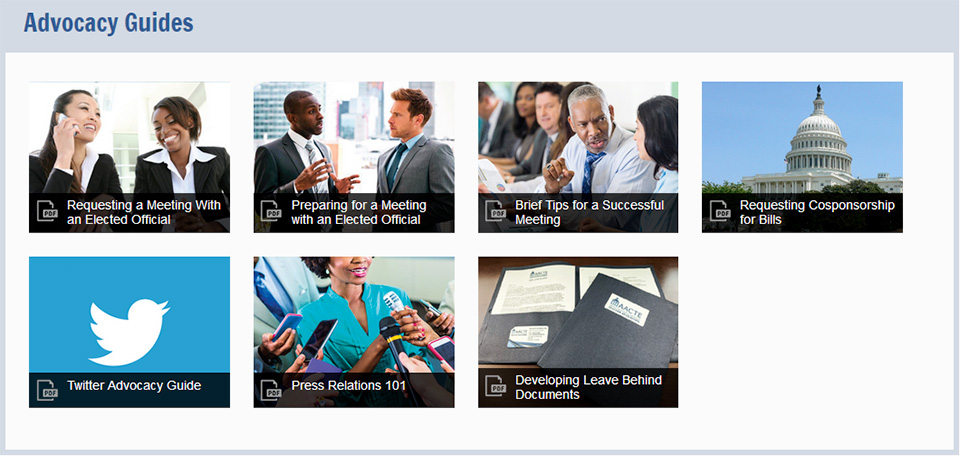
A new advocacy guide is now available for download in AACTE’s Advocacy Center. This guide, “Creating Leave-Behind Documents for Meetings With Elected Officials,” is part of our ongoing effort to provide opportunities to advance your advocacy capacity.
Through this AACTE members-only resource, you will learn of some best practices for developing materials to take to meetings with elected officials and other important stakeholders. As participants in AACTE’s Day on the Hill can attest, developing one-page “leave-behinds” for these meetings is important when time is short and you have much to share about your programs and their impact on your community and state. Leave-behind documents allow you to focus your meeting time on key talking points while supplying more in-depth information as a reference for elected officials or their staff. To learn more, check out the new guide!












